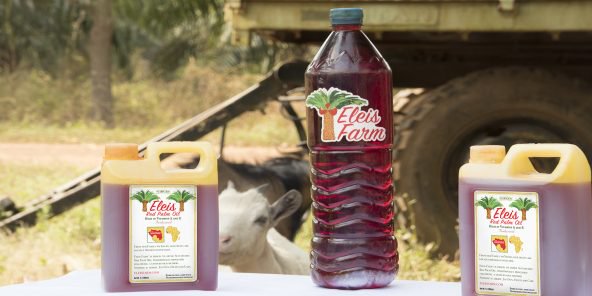With Eleis Farm, two Guinean brothers have embarked on the adventure of equitable palm oil, introducing the blockchain to certify their production.
The Barry brothers launched their social enterprise in 2014, with a few thousand dollars in savings. Two phone calls successively received by Hafi, the eldest, create a click. The first comes from an exporter who, taking advantage of the fall of the Guinean motto, wanted to place a large order. The second comes from the general secretary of a cooperative, seeking to sell less than a dozen cans of oil, to allow the women in his group to buy rice for wintering.
In response, he decides to start a business. Its goal is to bridge the gap between Guinean producers, guaranteeing them a fair income, and foreign consumers, offering them a quality oil. With the support of his family, he then embarked on the rehabilitation and modernization of the family plantation.
A difficult first year
“The first year was painful in more ways than one. We had to find money to upgrade our aging processing plant, funds to buy fruit from neighbors to reach critical mass, and qualified employees to bring the project to fruition, “Hafi recalls.
The brothers are concerned to improve production methods thanks to machines built by local craftsmen with recycled materials. Eleis Farm oil is fermented according to traditional methods and mechanically filtered at 5 microns. By revisiting the improved home concept, entrepreneurs are proud to have reduced water use by 80% in the production process. During the harvest months, Eleis Farm produces between 400 and 1,200 liters of oil per month and has generated profits since its beginnings in 2014.
The entire income is reinvested to maintain the 8 hectares of protected forest, the road leading to the landing stage, the wells and improve the plantation. Eleis Farm employs only women. “A sensitivity for these issues is, first and foremost, a corollary of our industry and our geographical position. Based in Kamsar less than 15 kilometers from the world’s largest bauxite plant, our plantation and surrounding villages are affected by rising water levels caused by mangrove deforestation. In addition, in Africa, palm oil has been a woman’s business since the beginning of time, “says Hafi.
Eleis Farm is the first Guinean finalist for MassChallenge, an organization created in Boston to help entrepreneurs start and grow new businesses. The company competed with start-ups from around the world and qualified in the top 5. At the top, the 26 best start-ups share $ 1.6 million, free access to premises as well as mentoring.
CUSTOMERS WILL SEE WHAT SMALL EXPLOITANT CULTIVATES ITS PRODUCT AND ATTEND THE PACKAGING PROCESS IN GUINEA
Targeting the African Diaspora in the United States
In 2018, after several market studies, the Barry brothers decided to export to the United States from the diaspora. “In northern Manhattan and the Bronx, the ecosystem of African supermarkets is thriving,” says Hafi. Eleis Farm already has a digital communication strategy to identify its customers by connecting Diaspora members and small farmers in Guinea via social media. “We use Instagram and videos to tell the stories of farmers and illustrate the environmental work we are doing,” says Maarouf, the youngest.
The Barry brothers want their industry to be transparent to consumers. “We are working with engineers and developers in Boston to develop a blockchain application in our supply chain system that will retain all the information in the value chain. This will allow our customers to see the course of their palm oil. Customers will be able to see which small farmer is growing his product and attending the packaging process in Guinea, “explains Maarouf. “Eleis’ partner farmers will receive a portion of the profits after the sale to the end customer. The integration of blockchain and mobile payment in Guinea will allow the customer in the United States to see their impact, “he continues.
Jeune Afrique


Leave a Reply